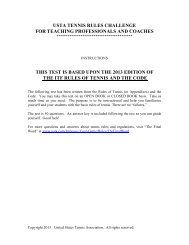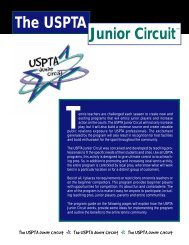California - United States Professional Tennis Association
California - United States Professional Tennis Association
California - United States Professional Tennis Association
Create successful ePaper yourself
Turn your PDF publications into a flip-book with our unique Google optimized e-Paper software.
Teaching Pro Income Replacement for Disabilities<br />
By Dave McKinney, USPTA<br />
When you think of insurance coverage, the two most<br />
common types—home and car insurance—are often<br />
the first that spring to mind. Because the mortgage<br />
company requires the former, and the law requires the<br />
latter, you don’t have much of a choice when it comes<br />
to deciding whether to be insured. However, it’s your<br />
ability to earn an income that allows you to afford<br />
these items. In fact, without earning potential, it would<br />
be difficult for many of us to maintain our homes<br />
and automobiles while still providing for ourselves<br />
as well as the family. The solution for supplementing<br />
this missing income in the event of a permanent or<br />
temporary disability is known as disability insurance.<br />
Disability insurance, along with life insurance, should<br />
be an integral part of your financial plan and what<br />
you’ll need to consider when choosing a policy to<br />
protect your income.<br />
Physical Abilities of Teaching Pros<br />
As tennis teaching professionals, our physical ability<br />
to teach tennis lessons and coach is a large part—if not<br />
all—of our earning potential. What happens if we are<br />
physically unable to teach for a longer period of time,<br />
such as three months or more, due to a major accident<br />
or illness? How will we pay for our mortgages, cars,<br />
utilities and other necessities that we depend on? For<br />
you and your family, it’s very important to have life<br />
insurance in place. When considering the importance<br />
of disability insurance, keep in mind that individuals<br />
are three times more likely to become permanently<br />
disabled than die from a major accident.<br />
Don Gomsi, executive director of the USPTA San<br />
Diego Division, once told me that at a period of time<br />
when USPTA offered optional disability insurance, he<br />
signed up for it. Shortly after that, he was in a major<br />
automobile accident that injured his knee and required<br />
two surgeries. He was off the tennis courts for over<br />
six months. However, his disability insurance kicked<br />
in after one month and covered his loss of income.<br />
Good for Don at that time for signing up for disability<br />
insurance. Unfortunately, USPTA does not offer that<br />
insurance option anymore.<br />
Social Security and Disability<br />
Many U.S. workers take disability risk management<br />
for granted because they assume that Social Security<br />
will take care of everything should they become<br />
disabled. Contrary to popular belief, qualifying<br />
for Social Security disability benefits can be quite<br />
difficult, and it can take a long time for benefits<br />
to start. To qualify, you must prove that you are<br />
incapable of performing any job, not just your<br />
primary occupation. As long as you can be gainfully<br />
employed, even if it’s at minimum wage, you won’t be<br />
able to collect Social Security disability payments.<br />
Protecting Your Income and Your Family<br />
When reviewing your risk management objectives,<br />
take a close look at your emergency reserves<br />
and liquidity capabilities. According to the U.S.<br />
Census Bureau, the average median monthly<br />
household income was $4,200 in 2010. This<br />
data strongly suggests that a supplemental income<br />
source would be a necessity for many Americans if<br />
they were to become disabled. It’s important that you<br />
understand the benefits provided, if any at all, by your<br />
company, as you may be covered under a short-term<br />
or long-term disability policy through your employer<br />
benefits plan. When it comes to disability insurance,<br />
“short-term” refers to periods of 90 days or less, while<br />
“long-term” refers to periods of more than 90 days.<br />
The Bottom Line<br />
What would happen to your household income if you<br />
became disabled for a long time? Hopefully, you and<br />
your family would be taken care of, but if you’re not<br />
sure that’s the case, now might be the time to cover<br />
that risk. Once you’ve determined what disability risk<br />
management you have in place, you can then make an<br />
educated decision as to whether you are fully insured<br />
or underinsured. If you lack the appropriate income<br />
replacement, you may want to consider buying a<br />
personal disability policy.<br />
Dave McKinney is the tennis director at<br />
Spanish Hills Country Club in Camarillo,<br />
Calif. He is an also an advisor with Heritage<br />
Capital Strategies, a consulting firm<br />
specializing in planning strategies to help<br />
clients create and preserve wealth. Dave can<br />
be reached at dmckinney@nfpsi.com.<br />
LineCalls 15
















